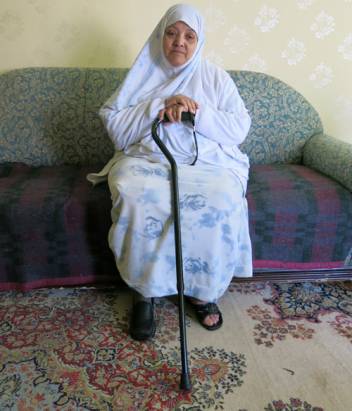Today on World Refugee Day, we are highlighting the plight of older refugees and refugees living with disabilities and injuries – the hidden victims of the Syria conflict.
It has been over three years since the first Syrians became refugees when they fled their homes and country, looking for a safer place. Today, nearly three million Syrians have been registered as refugees in neighbouring countries, of whom 600,000 in Jordan and 1,100,000 in Lebanon.
A staggering 30% of the refugees in Jordan and Lebanon are living with some type of impairment, chronic condition or significant injury. Many of these refugees are the hidden victims of the Syria crisis.
In both countries, Handicap International and HelpAge International support the most vulnerable refugees in the crisis and promote their access to basic and specific services. In particular, the organisations provide assistance to vulnerable older refugees and refugees living with a disability, injury or chronic condition.
Harsh realities of life in conflict
The Syria crisis has affected entire generations, regardless of age, health or wealth. But the exceptionally harsh realities of being old and/or disabled in this conflict are evident.
Entering the temporary home of Syrian refugees in Jordan and Lebanon, be it a tent, garage, or apartment, you are given a warm welcome. No matter how harsh their living conditions, people receive you with a smile and an ‘ahlan wa sahlan’, which means ‘welcome’ in Arabic. It was no different when we visited Basheera and her family.
 Basheera, 68, is a reserved and gentle woman, now living in Amman, Jordan. She describes her time in Damascus, Syria, and the events of the last few years, with enormous self-control.
Basheera, 68, is a reserved and gentle woman, now living in Amman, Jordan. She describes her time in Damascus, Syria, and the events of the last few years, with enormous self-control.
She was travelling with her son in a car to see her sister and was in high spirits. Suddenly explosions started and a wall of shrapnel hit the car, hitting Basheera in the right leg. Her son immediately drove her to hospital but her leg had to be amputated later the same day.
“I thought I was going to die. It wasn’t my body any more. I couldn’t stand it.”
It took more than a year before Basheera could walk with her artificial limb, which she still finds difficult to consider part of her.
When bombing intensified in Damascus, she and her family decided to leave for Jordan and she now lives with six of her immediate relatives in a small damp rented apartment.
As many Syrians have been living in temporary accommodation for long periods, what little money they had has now gone. Others had already lost everything during the war and have crossed the border with just the clothes on their back.
Basheera was prioritised by HelpAge International and Handicap International to benefit from cash assistance and she received 130 Jordanian Dinars a month (US$184), for a three month period as she had spent all her savings and was running up debts.
Her family’s priorities have been paying the rent, water and electricity bills, buying a little more food, and some hygiene products.
“We lived well before, all my sons worked. Life was good and I hope we can return soon. But her hopes are quickly dashed by her son, who says: “No mum, we’re not going back any time soon, what’s happening is terrible.”
Read more of Basheera’s story.
Download the report: Hidden Victims of the Syria Crisis (1.38 mb).
